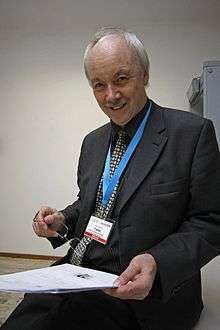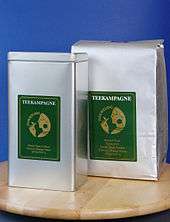Günter Faltin

Günter Faltin (born November 25, 1944 in Bamberg, Germany) is a German economist and entrepreneur.
Academic career
Faltin graduated with a Dr. rer.soc. from the University of Konstanz in 1972. His doctoral thesis investigated Milton Friedman's theory of consumer behavior. In 1977 he became Professor of Economics at the Free University of Berlin, where he has directed the entrepreneurship department since 2003. Several years ago he was appointed German Academic Exchange Service visiting professor in Asia. He conducted a scientific series of lectures and workshops in the US, Canada, Mexico, Brazil, Japan, South Korea, Thailand and India. He was deputy president of the German Society for Education, Invention and Innovation, (DABEI), Berlin Section between 1984 and 1988; and visiting professor and research consultant at Thammasat University, Bangkok, 1986, and Chiang Mai University 1988 - 1990 (sponsored by the German Academic Exchange Service). He is the co-founder of the International Academy Berlin (INA). In 1997, Faltin proposed the "Concept for Educational and Entrepreneurial Excellence", an international school that integrates innovative entrepreneurship into the curriculum. In 1999 he founded the Entrepreneurship Lab (Labor für Entrepreneurship) at Berlin Free University, which was taken on by Volkswagen's “Innovationscampus Wolfsburg" in 2000. As an expert for the project "Entrepreneurship in Education and Training in Russia and Ukraine", he conducted a series of workshops for the European Training Foundation (an institution of the European Union) in St. Petersburg and Kiev from 2000 to 2003.[1] In 2010 he followed an invitation of the government of Bhutan for a keynote to the conference on “High-tech and Entrepreneurship".
Business career

In 1985, he founded "Projektwerkstatt GmbH" with the idea of "Teekampagne" ("tea campaign"), a tea import company, which, in 1995, became the world's largest importer of Darjeeling leaf tea. Teekampagne is Germany´s market leader in mail-order tea sales. The company turned the German tea market upside down by betting on consumer education, transparency, and traceability. Faltin introduced a new business model: selling pure Darjeeling tea, controlled for chemical residues, in large packages, by mail order, at extremely competitive prices, while supporting the economy and ecology of the region of Darjeeling. In 1992 Faltin launched and sponsored the reforestation project S.E.R.V.E. (“Save the Environment & Regenerate Vital Employment"); the WWF is taking charge of the project on location in Darjeeling, India. The company also introduced water-hyacinth furniture to Germany. In 2006, he started the “CO2-Kampagne". He is business angel and coach of startups such as “eBuero AG" (2001) and RatioDrink AG" (2005).[2]
Foundations
Since 1995, Faltin is a founding member of the Berlin Startup Institute (“Existenzgründer-Instituts e.V."). In 2001 he set up the “Entrepreneurship Foundation" (“Stiftung Entrepreneurship"). Through the Entrepreneurship Foundation he promotes a new culture of entrepreneurship in Germany. He worked with Prof. Muhammad Yunus – one of the board members since inception of the Foundation – for a workshop at Volkswagen in 2000 as well as at the Vision Summits in Berlin, 2008 and 2009.
Honors
Faltin was granted the Award of the Price-Babson-Foundation, Boston, “For Bringing Entrepreneurial Vitality to Academe" in 1997; in 2007 he was given the "Vision Award for Entrepreneurship" on the occasion of the 2007 Berlin "Vision Summit". In 2009, he won the Deutscher Gruenderpreis (German Founder’s Award), as well as an award from Germany‘s Federal Ministry for Economics and Technology for his idea of „founding with components.” In 2010 he received the Federal Cross of Merit from the German president for his pioneer work on entrepreneurship. [3] [4]
Publications
In his best-selling book „Brain versus Capital“ (available in English since February 2013, original title "Kopf schlägt Kapital"), he proposes a radically new approach to generating entrepreneurial ventures with an emphasis on ecologically and culturally sensitive issues.
- Bildung und Einkommenserzielung: Das Defizit: Unternehmerische Qualifikationen. In: Axt/Karcher/Schleich: Ausbildungs-oder Beschäftigungskrise in der Dritten Welt? Frankfurt o. M. (1987)
- The University and Entrepreneurship In: Education in Transition. Wiesbaden (1992)
- Reichtum von unten, (G. Faltin und J. Zimmer, Berlin 2. Ed 1996). Greek Ed. 2004
- Das Netz weiter werfen - Für eine neue Kultur unternehmerischen Handelns In: Faltin/Ripsas/Zimmer (Ed.) "Entrepreneurship. Wie aus Ideen Unternehmen werden". Munich (1998)
- Competencies for Innovative Entrepreneurship, In Adult Learning and the Future of Work, Unesco Institute for Education, Hamburg,(1999)
- Creating a Culture of Innovative Entrepreneurship In: Journal of International Business and Economy, Vol. 2, No. 1, (2001)
- Für eine Kultur des Unternehmerischen – Entrepreneurship als Qualifikation der Zukunft In: Leistung – Lust & Last Bucher/Lauermann/Walcher (Ed..). Vienna (2005)
- Erfolgreich gründen. Der Unternehmer als Künstler und Komponist. DIHK, Berlin (2007)
- Kopf schlägt Kapital. Die ganz andere Art, ein Unternehmen zu gründen. Von der Lust, ein Entrepreneur zu sein. Carl Hanser Verlag, Munich, 2008
- Kopf schlägt Kapital. Audio Book (7 compact discs), spoken by Stephan Reimertz, 2009
- Brain versus Capital Stiftung Entrepreneurship, Berlin, 2013
Notes
External links
- Teekampagne
- Boston Tea Campaign, an offspring of Teekampagne
- Entrepreneurship Blog
- Freie Universität Berlin, Arbeitsbereich Entrepreneurship
|